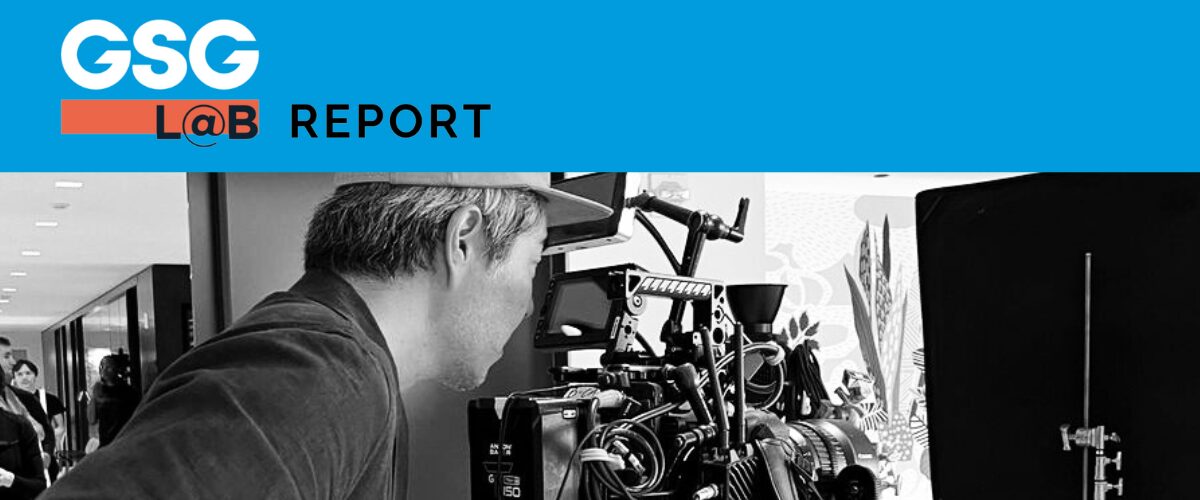
March 28, 2025
Welcome to The L@B Report
Welcome to this month’s issue of The L@B Report from GSG, bringing you news and insights from the intersection of digital media and public affairs. In this issue, we discuss TikTok’s DC advertising blitz, review another analysis of right-leaning content’s online dominance, and dig into the latest in the battle between AI companies and the creative industry.
This issue of The L@B Report was put together by Ryan Alexander.
In the News
With April’s Deadline Looming, TikTok Launches DC Advertising Blitz
But will it be enough to save the embattled social media platform?
According to POLITICO, TikTok launched a massive DC campaign earlier this month to sway lawmakers – and President Donald Trump – with ads that argue the app is important to the economy and that it is not a security threat to the United States.
The advertising inside the Beltway includes out-of-home ads in Metro stations and a full-page ad in POLITICO’s print newspaper that circulates on Capitol Hill. The DC ads are in addition to a campaign that TikTok has waged with TV commercials – including a Super Bowl spot – and billboards across the country.
Takeaway
The L@B Report previously reported on how TikTok activated its user base to lobby Congress, flooding members’ offices with calls. The activation angered members of Congress and likely backfired when the initial legislation to ban the app passed out of committee 50-0. It was a clear example of a grassroots activation that went too far – as it was launched at such a scale that it shut down congressional offices.
As we approach the April 5 deadline in President Trump’s executive order to force a sale or face a ban, it is interesting to watch TikTok’s current approach to marketing and grassroots activations.
So far, the company has stuck to traditional marketing tactics, such as newspaper ads, TV commercials, and subway station advertisements. TikTok has largely stayed away from directing their users at Capitol Hill this go-around, but the temptation to activate 135 million U.S. users must be there.
Media Matters Report Shows Right-Leaning Content Dominates Online Media
Right-leaning content seeps into sports, comedy, and other nonpolitical spaces
In a new study, Media Matters looked at the audience size (followers, subscribers, and views) of popular online shows, defined as podcasts, streams, and other long-form audio and video content regularly posted online.
The analysis focused on 320 online shows with a right-leaning or left-leaning ideology and concluded that right-leaning shows dominate the online ecosystem, with far larger audiences on both political/news shows and nonpolitical shows that “often platformed ideological content or guests.”
This graph illustrates the disparity between the audience sizes of top right-leaning and left-leaning online shows:

Takeaway
After the election, the L@B Report discussed President Trump’s successful outreach to younger men through alternative forms of media, such as podcasts, UFC fights, WWE events, and college football games.
The Media Matters report also comes on the heels of a Bloomberg analysis of more than 2,000 hours of podcast videos on YouTube shedding light on how podcasters in particular have helped push young men to Trump and the Republicans.
In addition, the number of people listening to podcasts monthly has reportedly more than doubled since 2016. According to a 2023 Pew Research study, 87% of people who hear news discussed on podcasts said they expect it to be mostly accurate and 31% said they trust podcasts more than other news sources.
With podcasts and online shows becoming more popular and trusted news sources, it’s never mattered more for public affairs, communications, and marketing professionals to add alternative media to their outreach and paid media efforts.
AI Companies Push to Use Copyrighted Content Freely
AI firms argue that their use of copyrighted material for AI is a matter of national security
According to a report from Axios, OpenAI and Google would like to see executive or legislative action that guarantees their ability to train models on copyrighted material because the “use of copyrighted material for AI is a matter of national security – and if that use is limited, China will gain an unfair edge in the AI race.”
In OpenAI’s memo to the White House, the company states “If the [Chinese] developers have unfettered access to data and American companies are left without fair use access, the race for AI is effectively over.”
Takeaway
While the AI companies in the Axios report stress national security, the argument really centers around the idea of “fair use,” a doctrine in United States law that allows limited use of copyrighted material without permission.
As Axios notes, copyright infringement claims were among the first legal challenges following ChatGPT’s launch, with multiple lawsuits now winding their way through the courts.
Groups representing actors, filmmakers, publishers, and other creative professionals have argued in court filings, public statements, and editorials that fair use is not broad enough to cover the wholesale consumption of massive datasets in AI training.
It will be interesting to see which argument wins – as the outcome has potentially massive implications for AI companies, the creative industry, and possibly our national security interests.
More from GSG

Earlier this month, GSG released the newest installment of its Eye on the Economy research series. Now in its fifth year, this latest edition identifies how voters’ attitudes and perceptions on the economy have shifted over the course of the last year, what economic news is breaking through, and how voters view the early actions of the Trump administration.